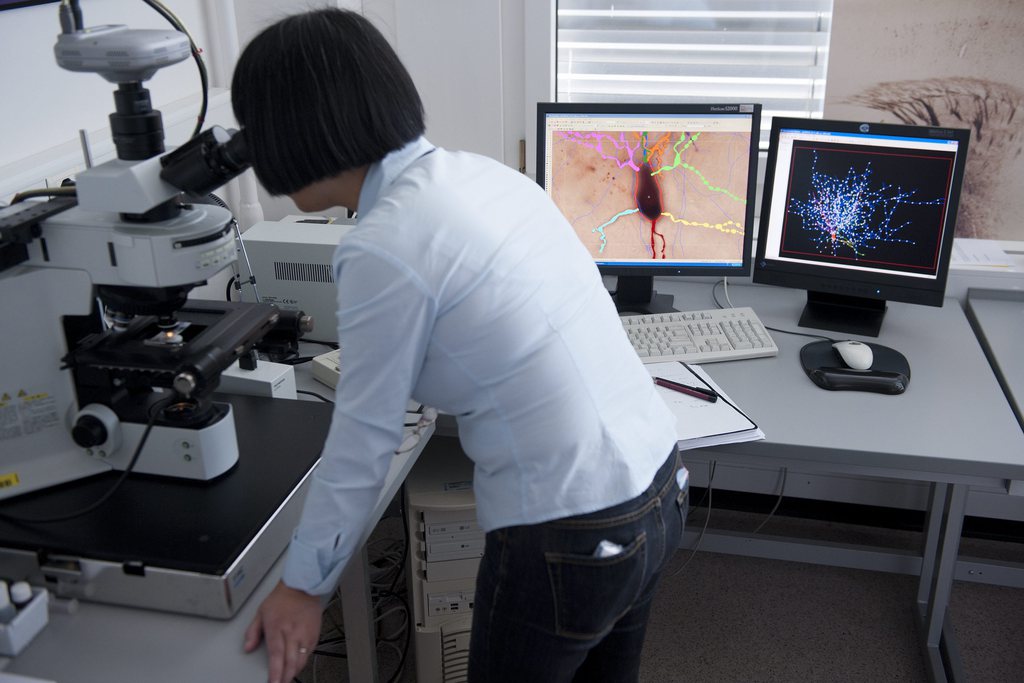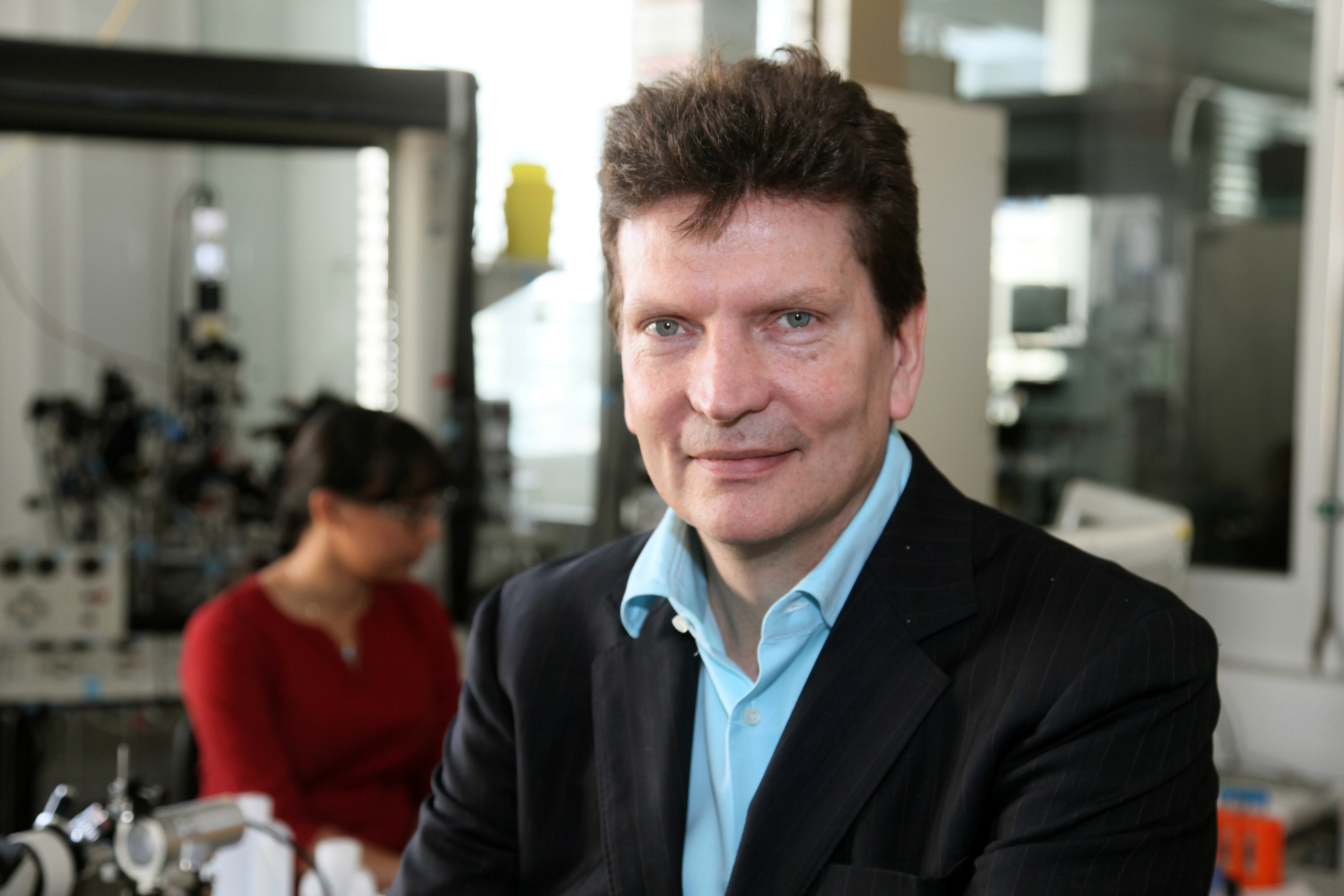Brain project gets green light for EU funding

The Human Brain Project (HBP), coordinated by Lausanne’s Federal Institute of Technology (EPFL), has been selected for one of the European Union’s Flagship grants, worth more than €1 billion (SFr1.25 billion) over the next ten years.
The HBP, which aims to map the brain, was on Monday declared the winner of the EU’s technologies contest along with the Swedish-led Graphene Flagship project. The two consortia were selected from four finalists for what the EU says is the largest-ever research award.
“Europe’s position as a knowledge superpower depends on thinking the unthinkable and exploiting the best ideas,” European Commission Vice-President Neelie Kroes said in Brussels.
“This multi-billion competition rewards home-grown scientific breakthroughs and shows that when we are ambitious we can develop the best research in Europe.”
The HBP will use supercomputers to create the most detailed model of the human brain to date. It will then simulate drugs and treatments for neurological diseases and related ailments.
EPFL president Patrick Aebischer said he was extremely pleased by the decision, capping a busy few years of preparation.
“I hope this will lead to some recognition of our work in the fields of brain research and simulation,” he told Swiss public radio.
“Extremely significant”
Swiss officials also reacted with delight to the news.
“This news is extremely significant for the scientific landscape in Switzerland as well as for this ambitious project that brings together the best European Research Institutions,” said Education Minister Johann Schneider-Ammann in a statement.
“Switzerland has already committed to supporting the project in several different ways and this success will undoubtedly place Europe at the centre of science’s greatest challenges, as for the Human Genome Project and Cern.”
The HBP brings together more than 80 European and international research institutions, including North American and Japanese partners. Coordination will take place under neuroscientist Henry Markam’s guidance at EPFL, along with Karlheinz Meier of Heidelberg University in Germany and Richard Frackowiak of the University of Lausanne.
The two winning projects were chosen by a panel of 25 experts including leading scientists, science and policy advisors, former heads of multinationals as well as experts on science and society.
The selection was based on which projects offered the best scientific and technological excellence and which would have the greatest impact.
Using a unique simulation-based approach, HBP aims to provide researchers worldwide with a tool to understand how the brain really works.
Future neuroscience: brain research is generating exponentially growing volumes of data and knowledge on specific aspects of the healthy and diseased brain, in different species, at different ages. New supercomputing technologies will help federate and manage the data, to integrate it in computer models and simulations of the brain, identify patterns and find gaps to be filled by new experiments.
Future medicine: Rising healthcare costs and the increasing number of European citizens who face the burden of caring for relatives with disorders of the brain. The HBP will collect the available clinical data, mining for biological patterns, leading to new ways of diagnosing and classifying brain diseases. This new approach opens up possibilities for new treatments.
Future computing: the brain manages billions of processing units, while consuming no more power than a light bulb. Understanding how it does this – the way it computes reliably with unreliable elements, the way the different elements of the brain communicate – can provide the key not only to a completely new category of hardware.
Research platforms: based on previous pioneering work by the project partners, the HBP will build an integrated system of six research platforms, providing scientists anywhere in the world with access to highly innovative tools and services that can radically accelerate the pace of their research.
Source: EPFL
Funding
Each of the projects will initially receive up to €54 million from the European Commission, cash remaining from the EU’s expiring 7th Framework research programme. Future funding will then come for a new programme, Horizon 2020, though the structure of that programme is still being negotiated.
“There will be careful monitoring during the lifetime of the projects so that the flagships continue to be an efficient use of taxpayers’ money,” the commission said in a statement.
Kroes told reporters she was confident that the funding would be available despite the Europe-wide financial crisis.
Around half the money will come from the EU, with the rest coming from member states, partner institutions and industrial backers. Kroes said, without providing any figures, that the same rules would apply for Switzerland, which is not a member of the EU but does take part in the union’s research programmes.
“People think it is a huge amount of money, but spread over ten years, it’s only €100 million a year,” Aebischer pointed out. “It’s not much compared with the €200 billion spent on brain research around the world every year.”
Graphene
The Swedish project will investigate the possible uses of graphene, the thinnest known material, which conducts electricity far better than copper, is at least 100 times stronger than steel and has unique optical properties.
Important future uses include the development of fast, flexible and strong consumer electronics, bendable personal communication devices, lighter airplanes and artificial retinas.
The universities of Basel, Geneva, Zurich, the Federals Institute of Technology in Zurich and the Swiss Federal Laboratories for Materials Science and Technology are all part of the graphene project.

In compliance with the JTI standards
More: SWI swissinfo.ch certified by the Journalism Trust Initiative












You can find an overview of ongoing debates with our journalists here . Please join us!
If you want to start a conversation about a topic raised in this article or want to report factual errors, email us at english@swissinfo.ch.